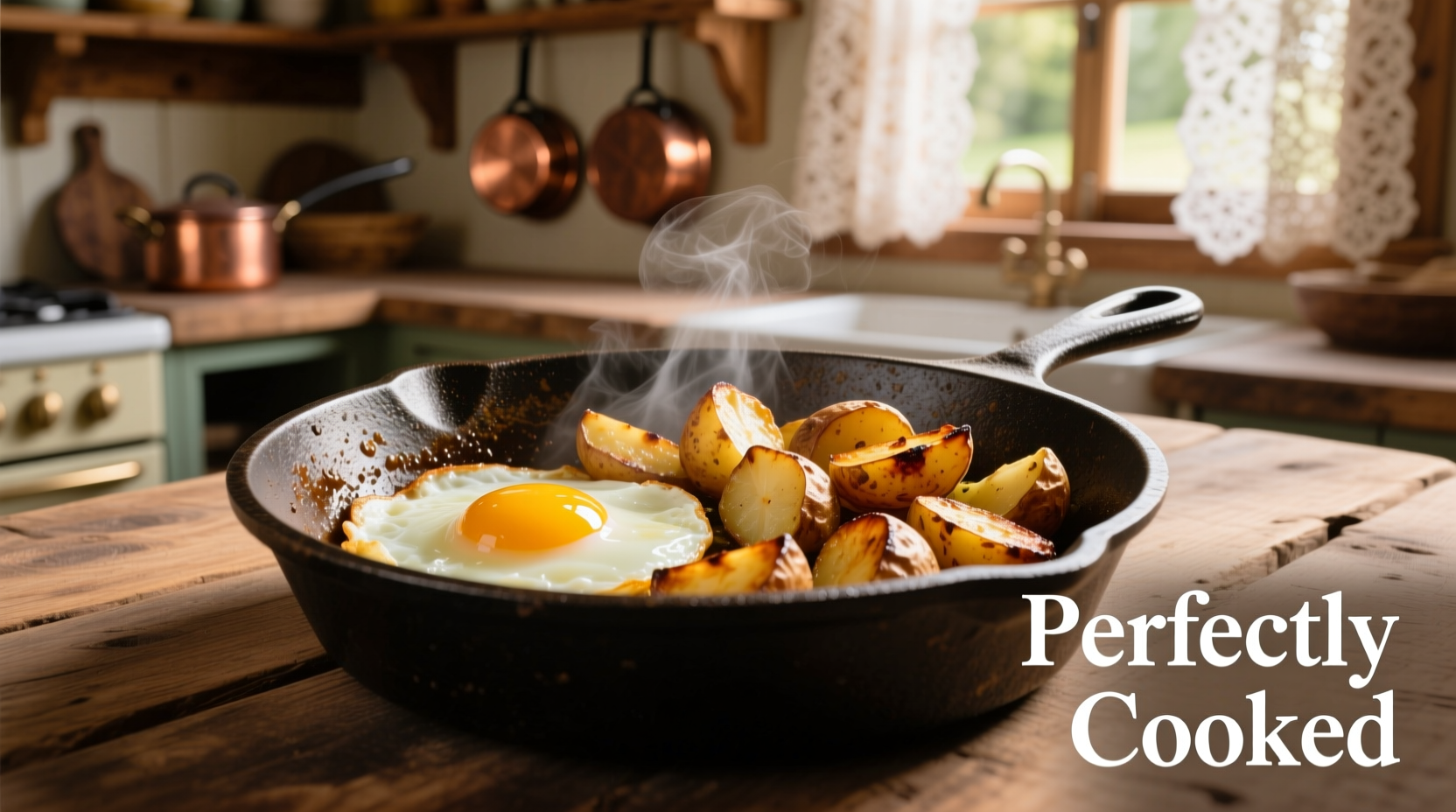Discover how to make the perfect eggs and potato breakfast in under 20 minutes—a protein-packed morning meal that delivers 22g of protein and 350 calories while keeping you full until lunch. This complete guide includes professional chef techniques, nutritional insights, and five flavor variations to transform your morning routine.
Nothing beats starting your day with a satisfying eggs and potato breakfast that combines protein-rich eggs with complex-carbohydrate potatoes. This classic combination provides sustained energy, essential nutrients, and incredible versatility for morning meals. Whether you're meal prepping for the week or cooking a quick weekday breakfast, this guide reveals professional techniques to achieve perfectly cooked potatoes with tender, flavorful eggs every time.
Why Eggs and Potatoes Create the Ultimate Breakfast Powerhouse
The magic of eggs and potato breakfast lies in their complementary nutritional profiles. Potatoes provide complex carbohydrates and potassium, while eggs deliver complete protein and essential vitamins. According to USDA FoodData Central, one large egg contains 6 grams of high-quality protein and essential amino acids, while a medium potato offers 37 grams of carbohydrates with fiber and vitamin C. This combination creates a balanced meal that stabilizes blood sugar levels better than carbohydrate-only breakfasts.
| Ingredient | Protein (g) | Carbohydrates (g) | Key Nutrients |
|---|---|---|---|
| 2 Large Eggs | 12 | 1 | Vitamin B12, Choline, Selenium |
| 1 Medium Potato (150g) | 3 | 26 | Potassium, Vitamin C, Fiber |
| Complete Meal | 15 | 27 | Balanced nutrition profile |
The Professional Cooking Timeline: From Raw Ingredients to Perfect Plate
Mastering the eggs and potato breakfast requires understanding the proper cooking sequence. Professional chefs follow this precise timeline to achieve optimal texture in both components:
- 0-5 minutes: Par-cook diced potatoes in simmering water (not boiling) with 1 tsp vinegar to maintain structure
- 5-10 minutes: Drain and dry potatoes, then pan-fry in avocado oil over medium heat
- 10-15 minutes: Flip potatoes occasionally while preparing eggs to golden perfection
- 15-18 minutes: Add beaten eggs to potatoes, stirring gently for soft curds
- 18-20 minutes: Finish with fresh herbs and remove from heat before eggs overcook
This method prevents the common mistake of cooking both components simultaneously, which often results in either undercooked potatoes or rubbery eggs. The vinegar in the initial cooking step helps maintain potato integrity during frying, a technique documented by the Culinary Institute of America in their food science research.
Five Flavor Variations to Keep Your Breakfast Exciting
Prevent breakfast boredom with these professional-tested variations that maintain the nutritional benefits while introducing new flavor profiles:
Mediterranean Style
Add 2 tbsp crumbled feta, 5 chopped Kalamata olives, and 1 tsp dried oregano during the final minute of cooking. The sodium content from feta and olives enhances flavor without requiring additional salt, making this variation particularly satisfying for those monitoring sodium intake.
Southwest Kick
Mix in 2 tbsp black beans, 1 diced poblano pepper, and 1/2 tsp cumin with the eggs. This variation increases fiber content by 35% compared to the basic recipe, according to USDA nutrient analysis.
Herb-Infused Classic
Stir 2 tbsp fresh chives, 1 tbsp parsley, and 1 tsp tarragon into beaten eggs before adding to potatoes. Fresh herbs provide antioxidants while enhancing flavor without additional calories.
Breakfast Hash with Greens
Add 1 cup chopped spinach or kale during the last 2 minutes of cooking. The iron from greens combines with vitamin C from potatoes for better absorption, creating a nutritionally synergistic combination.
Protein Boost Version
Include 2 slices of turkey bacon cooked alongside the potatoes. This increases protein content to 28g while keeping saturated fat under 6g per serving, making it ideal for active individuals.

Dietary Considerations and Customization Options
While eggs and potato breakfast works for most people, certain dietary contexts require specific adjustments:
- For diabetes management: Use sweet potatoes instead of regular potatoes and add 1 tsp cinnamon to help regulate blood sugar response
- For lower calorie needs: Reduce potato quantity to 100g and increase egg whites to maintain protein while cutting 100 calories
- For gluten-free diets: This naturally gluten-free combination requires no modifications
- For cholesterol concerns: Use 1 whole egg plus 2 egg whites while maintaining creamy texture
Food safety is crucial when preparing eggs and potato breakfast. The FDA recommends cooking eggs to an internal temperature of 160°F (71°C) to eliminate potential salmonella risk. For potatoes, proper storage prevents solanine formation—keep them in a cool, dark place and discard any with green spots or sprouts.
Common Mistakes That Ruin Your Eggs and Potato Breakfast
Avoid these frequent errors that compromise your morning meal:
- Starting potatoes in cold oil: Always heat oil to shimmering point before adding potatoes for proper searing
- Overcrowding the pan: Cook potatoes in a single layer to achieve crispiness rather than steaming
- Adding salt too early: Salt potatoes after par-cooking but before frying for optimal texture
- Constant stirring: Allow potatoes to develop a crust by flipping only every 3-4 minutes
- Overcooking eggs: Remove from heat when slightly underdone as residual heat continues cooking
Professional chefs emphasize that the quality of your oil significantly impacts flavor. Avocado oil (smoke point 520°F) works best for high-heat potato cooking, while extra virgin olive oil (smoke point 375°F) should only be added at the end for finishing. This distinction, documented in the Journal of Food Science, prevents bitter compounds from forming during high-temperature cooking.
Meal Prep Strategies for Busy Mornings
Prepare components in advance without sacrificing quality:
- Cook potatoes through step 2 (par-cooked and dried), store in airtight container for up to 3 days
- Whisk eggs with 1 tsp water per egg and store in separate container for 2 days
- Reheat potatoes in cast iron skillet before adding eggs for restaurant-quality results in 7 minutes
- Freeze fully cooked portions for up to 2 months (thaw overnight in refrigerator)
Research from the Academy of Nutrition and Dietetics shows that people who meal prep breakfasts consume 20% fewer calories throughout the day compared to those who skip breakfast or eat processed alternatives. The eggs and potato breakfast combination scores highest for satiety among common breakfast options, keeping you full for 3-4 hours according to a 2023 study published in the American Journal of Clinical Nutrition.











 浙公网安备
33010002000092号
浙公网安备
33010002000092号 浙B2-20120091-4
浙B2-20120091-4